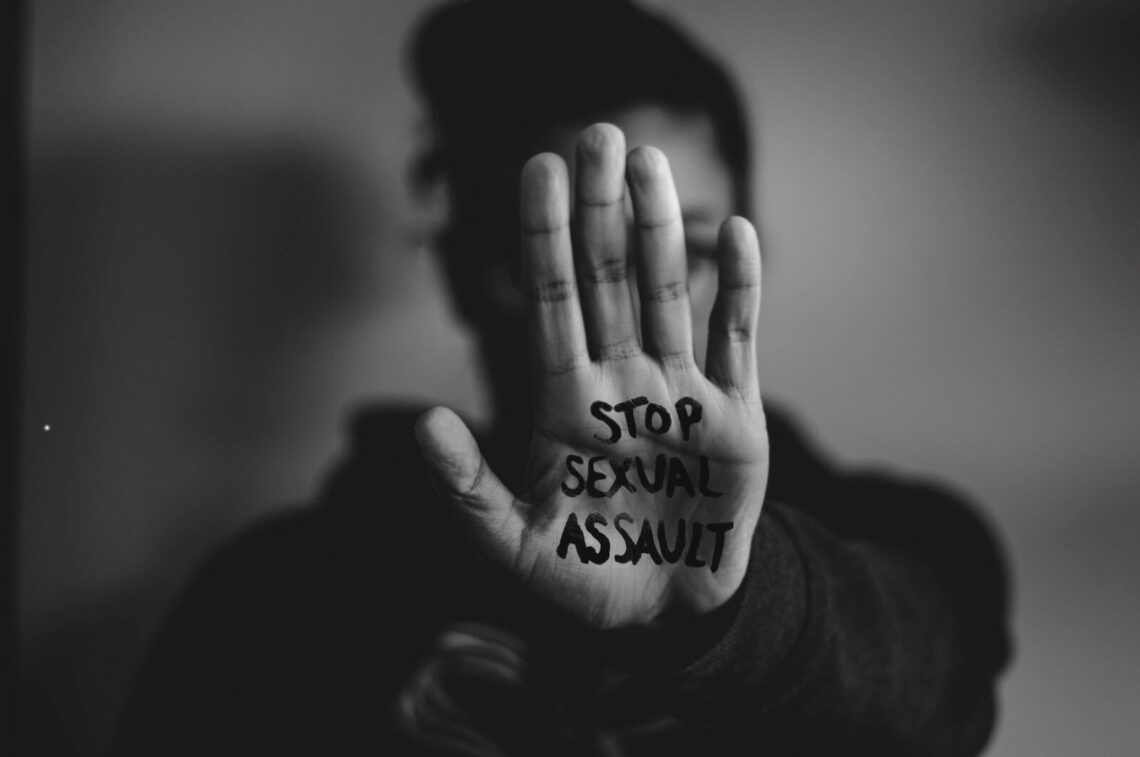By: Kaur Life Board
Trigger warnings: Sexual assault of minors; sexual abuse in Gurdwara; gender-based violence
Editor’s Note
We write this article in light of the recent community conversation regarding the 1997 Gurdarshan Singh sexual assault case. Kaur Life fiercely condemns all forms of gender-based violence and sexual assault. Unfortunately, sexual assault in Sikh spaces is a widespread and recurring issue. Our community must address lingering trauma that results from such crimes. We also must be proactive in implementing long term efforts in creating safe spaces.
In the development of this article, the Kaur Life board met to discuss the issue of sexual assault within Sikh spaces, and we discussed how to frame this article. We also spoke with several organizations who specialize in supporting sexual assault survivors, and we spoke with a survivor’s family. This article has been iterated several times, with several edits; each version being informed by the insights provided by the stakeholders we consulted. We did not rush to publication, as we wished to be sensitive, Gurmat-based, and survivor-centered. This is a grave issue that deserves thoughtfulness and time. Our ultimate goal is to support survivors of sexual assault and to help create a more just Sikh society which is free of sexual assault and gender-based violence.
Please note that Kaur Life is not trained in sexual assault response. Use of this article is not intended to replace or substitute any professional advice whether it be psychological, financial, medical, legal, spiritual, or other professional advice. If you have specific concerns regarding sexual assault or a situation in which you require professional, psychological or medical help, you should consult with an appropriately trained and qualified specialist.
#MeToo
The “#MeToo” era has ushered in long-overdue, public conversations about sexual harassment, sexual assault, survivor healing, and justice. This movement has shed light on the culture of violence perpetrated through misogyny and patriarchy while encouraging survivors to break their silence. #MeToo strives to empower survivors through empathy and solidarity by visibly demonstrating how many people have survived sexual assault and harassment. Speaking up publicly also directly challenges the associated stigma and shame of being a survivor of sexual assault or harassment that gets perpetuated by maintaining silence around these stories.
Though our Gurus made empowerment, social justice, and equality pillars of Sikhi, our panth has been slow to join the #MeToo discussion; we seem to find it difficult to put Sikh values and Gurmat into practice. Steeped in a culture of patriarchy, victim-blaming, and denial, many Sikh sangats struggle to have these conversations. However, as more cases are brought to the forefront of panthic consciousness, the tide is slowly changing. (As seen, for instance, in the #metoosikh campaign spearheaded by Kaur Voices ).
We are in awe of the courage of survivors who come forward to share their story in a community that continues to blame survivors for their trauma and abuse. In many cases this can be a difficult, emotional, and re-traumatizing process for them. We also know that many survivors choose not to share their story publicly because of this difficulty, and we respect that decision.
The Need for a Survivor-Centered Approach
When it comes to helping a survivor heal and seek justice, it is deeply imperative that they are in control of their own narrative, their own healing, and their own course of action. When this is not the case, and when the control is shifted away from the survivor themselves, it can put them in a higher level of crisis and re-traumatize them.
Countless gender based violence advocacy groups, sexual assault survivor agencies, and the UN (Resolution 2467), emphasize the need for a survivor-centered approach. Such an approach obtains informed consent from the survivor when providing them with services and when investigating crimes. This respects the safety and confidentiality of the survivor.
A survivor-centered approach also prioritizes the rights, wishes, perspectives, needs, and interests of survivor, and places these at the core of developing and implementing interventions towards the eradication of sexual assault.
In this model, the survivor has a right to:
- privacy and confidentiality (instead of exposure).
- dignity and respect (instead of being exposed to victim-blaming attitudes).
- choosing the course of action in seeking justice and dealing with the violence (instead of feeling powerless).
- non-discrimination (instead of discrimination).
The survivor-centered approach promotes the survivor’s recovery through self-determination.
We are calling for the creation of a Sikh environment where sexual assault can be spoken about openly as a crime; this is an essential step to breaking the silence around it. We are calling for a survivor-centered approach which must be on survivors’ own terms. “It is the right of survivors to be fully informed about their options to allow them to decide when and how they share their experiences, and for what purposes,” write Dr. Johanna E. Foster (Associate Professor of Sociology), Sherizaan Minwalla (human rights lawyer), and Nikki Marczak (Atrocity Prevention Coordinator).
Because Kaur Life has not gotten express written consent from survivors, we will not be sharing any survivor names or details of cases.
If you wish to understand why we made this decision, read our piece “Privacy of Survivors: Why Kaur Life Does Not Share the Names of Sexual Assault Survivors or Case Details Without Survivor Informed Consent”.
The Purpose of this Article
For us, sexual assault cases in Sikh spaces bring up several larger questions: “What is the gurmat response to addressing sexual assault? How do we bring perpetrators of sexual assault in Sikh spaces to justice, within a Gurmat framework? How do we create systems of accountability? How do we leverage Sikhi to create a culture that believes survivors? How do we, as a panth, support survivors in their healing journey?”
The main purpose of this article is:
- to signal our support to all survivors of sexual assault.
- to urge local sangats to learn from past mistakes to create a better future.
- to call for the accountability and transformation of our community power structures. Gurdwaras must be safe spaces for everyone, not just a space for people to wield power and control. When our community is not represented in leadership, the most vulnerable suffer greatly.
Why Aren’t Survivors Believed?
About 1 out of every 6 American women, and 1 in 33 American men, have been the victim of an attempted or completed rape in their lifetime. False reports are rare at 2% to 8%. So, if someone comes forward about being assaulted, they’re most likely telling the truth. Then, why is it so hard for people to believe them? Why does society blame the victim so quickly? Why does society defend the perpetrator so readily?
When the perpetrator is male, Vox staff writer Emily Crocket writes, “We often don’t want to do the work of reevaluating our personal heroes or of accepting that a powerful man who is a pillar of the community….could secretly be a monster.” This could be why so many people deny reports and allegations against religious leaders, like granthis – it is earth-shattering to realize that individuals who are responsible for guiding the sangat in a Gursikh life and building the tools to develop a relationship with Guru Sahib could enact such violence and harm with the same body.
Kaur Life Retreat guest speakers echoed this during the session Unlearning Internalized Patriarchy & Misogyny: It might feel safer and easier to disbelieve someone rather than to engage with the harsh reality about the information we are being told about the abuser. Especially if it’s someone we know. Sometimes, disbelieving is easier than calling into question your own collusion. Or, a disclosure may trigger someone’s own trauma, whether personal or societal and it is re-traumatizing for them to engage with the disclosure.
Another reason many people have a hard time believing survivors who are women, is due to a long history of misogyny, from laws to systems, from social norms to sexist beliefs. Traggicaly, rape denial has a long, twisted history in human society. We briefly wrote about the lowly status of women in South Asia, under the Brahmanical caste system. This illustrates how if women are believed to be “less than” men, then society will believe men over women.
Learning from Past Mistakes
The criminal aspect of addressing a sexual assault case can be dealt with by the authorities, (if this is chosen by the survivor). But, how does the local Sikh community address the moral and ethics aspects (if the survivor wishes this to be the route of justice)? If a survivor discloses abuse that’s been occurring in the Sikh community or Gurdwara, do we as a sangat or do gurdwara committees/leadership have a process in place to deal with it? or address the situation? Many times the answer is “no”. At best, there is an ad-hoc scramble. Oftentimes, there is no scramble at all. And at worse, there is an active cover up or denial.
This highlights several shortcomings in our sangat, specifically in the United States:
- We have not implemented processes to deal with sexual assault:
- We have not adequately implemented Sikh-specific systems of justice for the perpetrator.
- We have not adequately implemented Sikh-specific support systems for the survivors.
- We do not have an adequate number of safe community environments:
- Many survivors do not feel safe disclosing abuse in Sikh spaces.
- Rape culture persists and sexual assault prevention is not a priority in many Sikh communities.
Let’s examine each of these in turn.
Sikh-Specific Systems of Justice
How do we bring perpetrators of sexual assault to justice – from a gurmat perspective?
“What does justice look like from a gurmat perspective in our current world?” asks Harleen Kaur, Kaur Life board member. “… it certainly holds those who have committed harm across the spectrum accountable….What possibilities of liberation are we earning if we base our accountability in a western nation-state rather than justice inspired through accountability and Ik Onkar?”
Panj Piare
Traditionally, those who have violated Sikh standards of our code of conduct are brought to a Panj Piare to give a formal, public apology, ask for forgiveness, and receive their punishment. Based on the panchayat system of villages, this is a self-governing way of keeping the peace and administering justice.
What would using the Panj Piare to create community systems of justice and healing look like in a modern context? How can we re-develop and re-elevate this institution into a community recognized and respected mechanism of justice that is fair, just, transparent, accountable, and honorable? What would a Panj Piare system of justice look like if it’s survivor-centered and survivor-informed?
One idea to consider is that five amrit-dhari Sikhs (Kaurs and Singhs) who do not have a record of inflicting harm on others, who are versed in Gurmat, rehat, tvarik, and are trained in transformative restorative justice, survivor-centered healing, sexual assault response, and criminal psychology are brought together to deliberate on sexual assault cases and recourse within a Sikh community, while being survivor-centered and survivor-informed.
But questions remain. How do we ensure these five Sikhs are acting in the best interest of the survivor? How do we ensure that these Sikhs are actually Gurmat centered? How do we make sure that these five Sikhs are not harboring perpetrators? At what point would state intervention and legal action be necessary?
Sikh-Specific Support Systems for Survivors
“If we are truly sovereign,” says Kaur Life reader and lawyer, Harjot Kaur. “We need to design our own way of dealing with sexual assault in a way that actually promotes healing for survivors and our community.”
Many gurdwaras lack trained people and systems that could support survivors of sexual assault. Right now, if a person comes forward and discloses an abuse, many gurdwaras would be at a loss on how to support them, even if they wanted to. In some cases, there is also the complication of gurdwara committee power dynamics – often the people who have the power to get away with abuse and need to be held accountable are protected by the committee or other people in power, which prevents gurdwaras from being spaces for support for survivors.
It is imperative that gurdwaras create survivor-centered pathways to healing and justice. There are many culturally-specific organizations that specialize in this and can team up with Gurdwaras to distribute resources or create programming. Perhaps together, they can determine what is best for each community or each case – whether it be healing circles, advocacy campaigns, training, or something else.
Survivors Do Not Feel Safe Disclosing Abuse
“We need to be better at creating safe, nonjudgmental spaces to talk about sexual assault,” said Harjot Kaur. “When we don’t, the pain lingers.”
Many survivors express that they do not feel safe or comfortable disclosing abuse. This means, we as a sangat have not created a safe space for them to do so. We must illustrate, through our actions of accepting the survivor’s experiences and supporting the pursuit of justice, that we really care.
Here are a few ideas on how to create safe-spaces at gurdwara and in other Sikh spaces:
- Believe the survivor.
- Be supportive and tell them that you believe them.
- Reassure them that they did nothing wrong and that you are there for them.
- Listen.
- Learn how you can support them in their decisions regarding their case.
- Seek justice that is led by the survivor. The sexual assault survivor advocacy groups that we consulted explained to us that the survivor should be in charge of determining what they want and need when it comes to seeking justice. This gives the survivor choice and agency, which was taken away from them during the attack. If others make decisions on their behalf, they are again made powerless which can be re-traumatized. The survivor may choose to seek support from organizations, press charges, push for perpetrators and enablers to acknowledge their past offenses or mishandlings, accept responsibility for their actions, or publicly apologize.
- Educate ourselves around the issue and on what steps we can take in supporting people if they disclose abuse.
- Train sangat members in sexual assault response.
- Reflect on and understand gurbani to build a Gurmat-rooted understanding of respect and humanity of all.
- Center reflection on and understanding of Gurbani to facilitate healing.
- Co-host lectures with community organizations at Gurdwara on “How to dismantle rape culture” or “What is consent?”
- Create and distribute sexual assault survivor resources, brochures, and flyers.
- Take women seriously in all matters – develop a culture of respect.
- Once someone is convicted of a sexual offense and the case is closed, perhaps we can circulate a notification to all Gurdwaras and national Sikh organizations so this person cannot, for instance, be re-hired as someone who is in close proximity to children in Sikh spaces.
- Amend gurdwara by-laws stating no committee member, employee, granthi, or sevadar will be given a position, the stage, or access to children if they have been convinced of domestic abuse or sexual assault.
- Challenge the izzat (honor) culture. Many survivors say they did not disclose abuse due to shame and fear of their reputation being ruined. Unfortunately, the importance of maintaining family honor and identifying with izzat is often linked to personal shame.
Rape Culture Persists
In part, sexual assault continues to happen due to persistent rape culture; sadly, preventing sexual assault is not a priority for many Sikh communities.
Rape culture is an environment in which rape is prevalent and in which sexual violence against women is normalized and excused in the media and popular culture. Rape culture is perpetuated through the use of misogynistic language, the objectification of women’s bodies, and the glamorization of sexual violence, thereby creating a society that disregards women’s rights and safety.
Egregious manifestations of rape culture, like rape or domestic abuse quickly come to mind, but seemingly “small” offenses are the result of rape culture too. For example, victim-blaming, sexually explicit jokes, publicly scrutinizing a survivor’s clothing/mental state/motives/history, defining “manhood” as dominant and sexually aggressive, defining “womanhood” as submissive and sexually passive are a few examples…the list goes on.
We must recognize, as a community, that this is a problem and that we must change it. This is especially relevant in cultures that stem from South Asia, where sexual violence against women is broadly prevalent and accepted.
We can start by clearly articulating and implementing plans at our local gurdwaras on how to dismantle rape culture and mitigate toxic masculinity. This could include:
- mandatory training on sexual harassment prevention for leadership positions
- due diligence protocol prior to on-boarding sevadars/leaders
- developing systems of accountability for sevadars/leaders
- being transparent about sevadar/leaders’ background and history
- discouraging language that objectifies or degrades women
- discouraging homophobic or transphobic language and policies
- encouraging women to take on divan hall sevas, committee membership, and granthis positions
- encourage gender neutral and non-heteronormative language
- creating women-only divans
- challenge sexist lyrics of Punjabi pop songs
- speaking out if you hear someone else making an offensive joke or trivializing rape
- be respectful of others’ physical space, even in casual situations (ie- don’t expect or demand hugs as greetings)
- host lectures on gender, relationships, and violence in Sikh and Punjabi culture
- take disclosure seriously
- teach kids about consent and respect at camp and Khalsa/Punjabi school
- push for and ensure that leaders do not bar certain sevas based on gender, sexuality, or sex (ie: some gurdwara leaders and granthis prevent people who are menstruating from doing Guru Granth Sahib seva).
Conclusion
“As Sikhs, we cannot be silent about sexual violence,” says Kaur Life Board member, Harleen Kaur. “We cannot continue to sweep these issues under the rug. By hiding, protecting, and continuing to support perpetrators, our people are put in direct danger…How can we continue to claim that gurdwaras are places of refuge for anyone who needs shelter if we cannot keep them safe for our own?”
Ask yourself: What do you have left to learn or understand? How can you create a collective learning process around topics of gender and safety with your sangat? What steps will you take to act on this new knowledge in your community to build a safer environment? Who will be on your team? Which organizations can you recruit? What elements of Gurmat will you leverage? What initiatives are you going to volunteer with? How will you advocate for better systems and spaces in your sangat? What survivor-centered approaches to healing can you employ?
Note:
To those who wish to support survivors in healing and pursuing justice and to those who wish to engage in sexual assault survivor advocacy/activism, we strongly encourage you to train with and/or consult professionals, experts, and organization who specialize in this topic. The last thing sevadars would want to do is unintentionally cause more harm than good. Furthermore, these entities can equip you with the tools and knowledge to be effective, sensitive, and survivor-centered in your endeavors.
Resources:
The Sikh Family Center’s mission is to promote healthy and violence-free families across the United States by providing community education and support services, facilitating access to public resources, and empowering grassroots community leadership. Our intervention, prevention, and education are provided with particular attention to cultural tradition, immigration experience, and language capability.
The Sikh Awareness Society (SAS) is a community based, non-profit organization formed in 1998 by the British Sikh community who felt an urgent need to raise awareness of sexual abuse, violence and grooming of young Sikhs. Area Served: UK.
The Sikh Helpline strives to provide support for Sikhs who face racism, family problems, school problems, immigration issues, employment challenges. Area Served: Australia.
Karma Nirvana – is an organization supporting all victims of honor based abuse and forced marriage. Jasvinder Sanghera, who was born into a Sikh family set up the organization to speak out against honor killings. Area Served: UK.
Raksha is a non-profit serving the South Asian community since 1995. Raksha’s mission is to promote a stronger and healthier South Asian community through confidential support services, education, and advocacy.
Apna Ghar provides holistic services and conducts advocacy across immigrant communities to end gender violence.
Daya serves south Asian women, children and men in the Houston area who have been the victims of domestic violence or sexual assault.
Sakhi for South Asian Women exists to represent the South Asian diaspora in a survivor-led movement for gender-justice and to honor the collective and inherent power of all survivors of violence.
Manavi has a mission to end all forms of violence against women specifically addressing the unmet needs of South Asian women affected by violence.
Disclaimer:
Please note that Kaur Life is not trained in sexual assault response. Use of this article is not intended to replace or substitute any professional advice whether it be psychological, financial, medical, legal, spiritual, or other professional advice. If you have specific concerns regarding sexual assault or a situation in which you require professional, psychological or medical help, you should consult with an appropriately trained and qualified specialist. This article, its authors, Kaur Life, Kaur Life’s affiliates, and the publisher are not responsible for the outcome or results of following any advice in any given situation. You, and only you, are completely responsible for your actions.





1 Comment
Controversial WH McLeod
10/19/2020 at 7:38 pmAbsolutely and this isn’t just in the Gurdwara setting. It is in academic spaces. [Original comment edited to be sexual survivor centered].